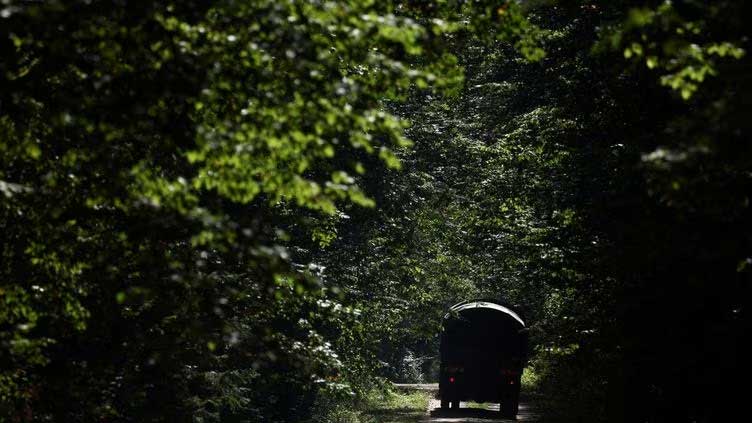Poland election campaign polarised by anxiety over migration

World
Poland election campaign polarised by anxiety over migration
DUBICZE CERKIEWNE, Poland (Reuters) - In Dubicze Cerkiewne, a Polish village next to one of Europe's last primeval forests, few tourists come any more and soldiers based in the school gym help intercept migrants squeezing through the nearby fenced border from Belarus.
Just a few km (miles) away from the razor-tipped fence lining the frontier, Dubicze faces a renewed surge in illegal migration that has stirred anxiety and dominated public debate ahead of a closely-fought election in Poland on Oct. 15.
The populist nationalist Law and Justice (PiS) government has cast the ballot as a choice between security it says requires keeping migration at bay and an existential threat the country would face if the liberal opposition wins the vote.
"Do we want news headlines to be warning us soon about drug gangs, or about another shooting in Bialystok, Siedlce, Krosno, Sanok, Kolobrzeg, Jelenia Gora or Warsaw?!" Prime Minister Morawiecki said on Thursday, listing cities across Poland.
"Do we want this? Because today these are exactly the headlines in Sweden, in Paris, Marseille, in Italy," he told reporters in Warsaw before departing for a European Union summit in Granada, Spain where migration was a fraught topic on Friday.
The message from Morawiecki, who in Granada accused the EU trying to force Poland to accept illegal migrants or face fines, resonates with some Dubicze residents, although PiS faces an uphill battle for votes in the village.
It and its main rival, the liberal Civic Platform (PO), each won about 30% there in the 2019 parliamentary election.
This time, polls show PiS is likely to re-emerge as the largest vote-getter across Poland but may lose its majority, amid discontent over soaring costs of living and what critics call the party's subversion of democratic standards.
Helena Mojsewicz, a shopkeeper in Dubicze, lauds the border fence and presence of troops. Thousands have deployed to the border area since the summer against potential "hybrid threats" - illegal migration - from Belarus, the government says.
"If the army goes, I will close the business. If the government takes down this fence, they (migrants) will walk in like ants," the 56-year-old Mojsewicz said.
She plans to vote "No" in a referendum to be held on Election Day in which one of several questions says: "Do you support the admission of thousands of illegal immigrants from the Middle East and Africa under the forced relocation mechanism imposed by the European bureaucracy?"
The opposition accuses PiS of misusing public funds for a campaign exercise designed to energise its supporters and demonise opponents with a series of loaded questions.
ACCUSATIONS OF PUSHBACKS, MISTREATMENT
Dubicze villagers have seen all sides of illegal migration, including battered strangers stumbling out of the border forest and mobile police roadblocks to check cars for people smugglers.
"I don't know if anyone in Poland has the experience of passing a speeding Rosomak (military transport vehicle) on a narrow country road. We have it," said Wojciech Siegien, a school psychologist who will vote for the opposition.
Human rights activists have accused Poland of mistreating migrants - mainly from the Middle East and Africa - seeking access from Belarus, saying thousands have sought their protection after crossing the border.
Protecting Rights at Borders (PRAB) is a group that aims to document evidence of pushbacks - illegal under international human rights and refugee statutes - in the context of border management in the EU. It says more than 3,000 people have been denied access to asylum procedures and forced back into Belarus from Poland between May and August of this year.
A few dozen migrants have died as a result since mid-2021, activists say, mostly of hypothermia and disease in the swampy border woods. About 300 are missing. Poland denies wrongdoing.
Such alleged abuses have come to light most recently in the award-winning new film by renowned Polish director Agnieszka Holland, "The Green Border", which the PiS government denounced as a disloyal insult to forces protecting the nation's borders.
"Watching the Syrian family in the film ..., I remembered a family of about 30-year-olds with a small child, brought to us one night," said Tomasz Musiuk, a senior physician at a hospital in Hajnowka, 16 km (10 miles) north of Dubicze.
"The child and her mother stayed in the hospital, while the man was taken away by the border guard. I don't know what happened to them later," Musiuk said, his voice cracking.
"I think 99% of the migrants who ended up in the hospital should not have been there at all."
For some Dubicze residents, the choice is complicated.

